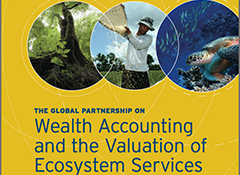
At the end of its second year, the WAVES program—the global partnership on Wealth Accounting and the Valuation of Ecosystem Services—is moving forward with all its goals and in the coming year will be processing requests from many more countries that have already signed on to the WAVES initiative, according to the WAVES 2013 annual report.
The five WAVES partner countries—Botswana, Colombia, Costa Rica, Madagascar, and the Philippines—have completed their preparation phase activities: establishing National Steering Committees, extensive multistakeholder consultations, detailed scoping studies to diagnose their readiness and identified policy priorities for natural capital accounting (NCA), and the design of four-year work plans to implement NCA.
WAVES countries are now starting to implement their work plans. Botswana has already completed preliminary water accounts. Country coordinators have been hired in most countries, and there has been a strong emphasis on building broad institutional support and frameworks to ensure long-term sustainability of NCA in WAVES countries.
Rio+20, the United Nations Conference on Sustainable Development held in 2012, helped move NCA to the top of the global agenda—62 countries and 90 private sector organizations expressed their support for natural capital accounting—in a campaign led by the World Bank.
Meeting requests from this new set of countries and organizations will require a coordinated effort by the World Bank, U.N. agencies, regional development banks, bilateral donors, civil society organizations, and others.
Highlights from the Annual Report include:
- Regional workshops are being planned to provide countries with detailed plans on how to begin implementation. The first workshop was held in the Middle East and North Africa (MENA) Region in March; others are planned for the Latin America and Caribbean (LAC) and Africa Regions during this fiscal year. A diagnostic tool is being developed to help countries identify data gaps before they develop work plans for NCA.
- The inaugural meeting of the Policy and Technical Experts Committee (PTEC) brought together experts in environmental economics, the natural sciences, statistics, and policy. PTEC is developing training materials for NCA, beginning with the development of a diagnostic tool for the System of Environmental-Economic Accounting (SEEA) that will provide a systematic approach for countries wanting to introduce NCA or to evaluate their current NCA work.
- NCA is gaining increasing traction in both the Sustainable Development Network and the Poverty Reduction and Economic Management Network within the World Bank.
- A strong communications strategy promotes natural capital accounting globally. A partnership website, newsletter, country case studies, and the use of social media are helping guide the global dialogue on NCA and building evidence on how it can be useful for countries.
Fundraising efforts have been very successful. In addition to the “founding donors”—the United Kingdom, Norway, Japan, and France—substantial contributions were received from the Netherlands, the European Community, Denmark, and Germany, for a total of $19.6 million. Additional funding is needed to support the countries looking for technical and financial support after Rio+20. (After publication of the Annual Report, the Government of Switzerland committed $5 million to support two complimentary initiatives within the World Bank and the IFC.
Highlights from WAVES Countries
- Botswana: Preliminary water accounts were completed and implementation of the rest of the work plan will begin in the coming year with a newly constituted Steering Committee and country coordinator and high-level Government support.
- Colombia: The National Statistics Office organized a workshop on national accounts and environmental satellite accounts. The WAVES Technical Committee agreed upon a work plan, including priority accounts to be completed on water and watersheds.
- Costa Rica: A Steering Committee was formalized and national consultative workshops were attended by over 100 participants from the Ministries of Environment, Planning, and Tourism, from the Central Bank, and from academia and NGOs. Five priority sectors for accounts were identified (water, forests, marine resources, tourism, and energy) and a Memorandum of Understanding was agreed to by the two leading agencies.
- Madagascar: The first formal meeting of the Steering Committee was held in August 2012 and the WAVES work plan was validated. It will focus on the creation of natural capital accounts related to mining, forestry, and water sectors have been completed. Priority technical activities in the next six months include working with an environmental accounting specialist in the mining, water, and forestry sectors. Development of satellite accounts for tourism in protected areas will commence later in 2013.
- Philippines: The feasibility of NCA in many different sectors was assessed and minerals, mangroves, and water resources were identified as priorities for WAVES Philippines. The work plan for the first 18 months includes the construction of national mineral and mangroves accounts and ecosystem accounts in Southern Palawan and the Laguna Lake basin.
WAVES is also engaged in discussions about how NCA can contribute to the Sustainable Development Goals (SDGs), building on the Millennium Development Goals. Achieving a number of the SDGs will depend on sound management of natural assets. NCA can provide the information to support this.

